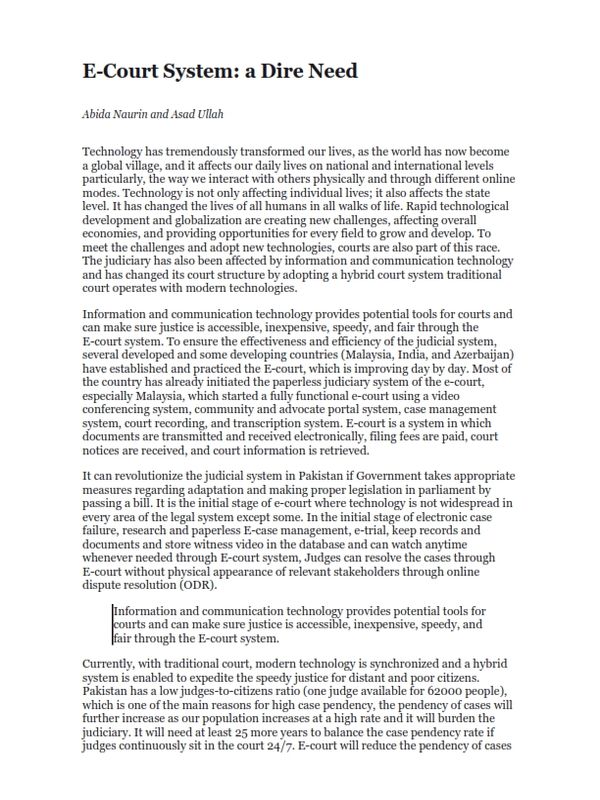E-Court System: A Dire Need
Technology has tremendously transformed our lives, as the world has now become a global village, and it affects our daily lives on national and international levels particularly, the way we interact with others physically and through different online modes. Technology is not only affecting individual lives; it also affects the state level. It has changed the lives of all humans in all walks of life. Rapid technological development and globalization are creating new challenges, affecting overall economies, and providing opportunities for every field to grow and develop. To meet the challenges and adopt new technologies, courts are also part of this race. The judiciary has also been affected by information and communication technology and has changed its court structure by adopting a hybrid court system traditional court operates with modern technologies.
Information and communication technology provides potential tools for courts and can make sure justice is accessible, inexpensive, speedy, and fair through the E-court system. To ensure the effectiveness and efficiency of the judicial system, several developed and some developing countries (Malaysia, India, and Azerbaijan) have established and practiced the E-court, which is improving day by day. Most of the country has already initiated the paperless judiciary system of the e-court, especially Malaysia, which started a fully functional e-court using a video conferencing system, community and advocate portal system, case management system, court recording, and transcription system. E-court is a system in which documents are transmitted and received electronically, filing fees are paid, court notices are received, and court information is retrieved.
It can revolutionize the judicial system in Pakistan if Government takes appropriate measures regarding adaptation and making proper legislation in parliament by passing a bill. It is the initial stage of e-court where technology is not widespread in every area of the legal system except some. In the initial stage of electronic case failure, research and paperless E-case management, e-trial, keep records and documents and store witness video in the database and can watch anytime whenever needed through E-court system, Judges can resolve the cases through E-court without physical appearance of relevant stakeholders through online dispute resolution (ODR).
Information and communication technology provides potential tools for courts and can make sure justice is accessible, inexpensive, speedy, and fair through the E-court system.
Currently, with traditional court, modern technology is synchronized and a hybrid system is enabled to expedite the speedy justice for distant and poor citizens. Pakistan has a low judges-to-citizens ratio (one judge available for 62000 people), which is one of the main reasons for high case pendency, the pendency of cases will further increase as our population increases at a high rate and it will burden the judiciary. It will need at least 25 more years to balance the case pendency rate if judges continuously sit in the court 24/7. E-court will reduce the pendency of cases and will eradicate the time, failure, and document costs.
The need for an E-court was harshly felt during the pandemic and amid lockdown, as every office, education institute, mosque, market, and judiciary were closed or need to operate virtually. Pakistani judiciary was also facing trouble in the dispensation of justice, but our judiciary had no such technological infrastructure to operate partially and virtually, most of the hearings were called off to curb the spreading of covid19 virus. The judiciaries limit their staff and there was a dire need for technology for hearing online cases. That’s why it was the need of the hour to install advanced technology which operates with the traditional court system. Introducing an online case management system was the step taken by the Islamabad high court and Lahore high court toward the digitalization of the judiciary. To make the justice system more convenient, affordable and service accessible three members’ bench headed by the former chief justice of Pakistan Asif Saeed Khosa launched its first e-court system by adjudicating its first online case in July 2019 after witnessing appeared through a video link on skype from another registry of the province court was second step towards digitalization of judiciary. But they were continuously facing an interruption in connectivity due to low technological infrastructure and internet. As Pakistan Institute of Development Economics has already done work and included “Internet for All” in their reforms agenda and written knowledge brief on it. Stunning technological advancement will be needed to enhance speedy justice for every individual without delaying particularly, for vulnerable and distant citizens. As Pakistan is among the lowest countries 130th out of 139 nations in the adherence to rule of law according to the world rule of law index project 2021. ICT will boost citizens’ trust in the judiciary and reduce the backlog of cases.
Pakistan faces hurdles created by a legal professional in the implementation. As we have seen that lawyers went on strike after the establishment of the model court system. The reason they create hurdles is the lawyers practice for their gain and want to delay cases. Unreasonably delaying justice to the victim means that it’s a violation of fundamental human rights because he/she will suffer irreparable due to delay. we need to adopt technology and a proper framework in the judiciary structure to revolutionize the judiciary system which will reduce the backlog of cases and will expedite the justice system for poor and distant people. In a nutshell, E-court is very cheap, effective, timesaving, speedy justice reduces backlog cases, more economical than conventional. With each passing day, technology is growing and e-court can be said will increase transparency, enhance the dispensation of justice, save a huge sum amount of government, decrease public spending, speedy justice, and make jobs opportunities for skilled workers. In the dispensation of justice, e-court will be a game changer.




